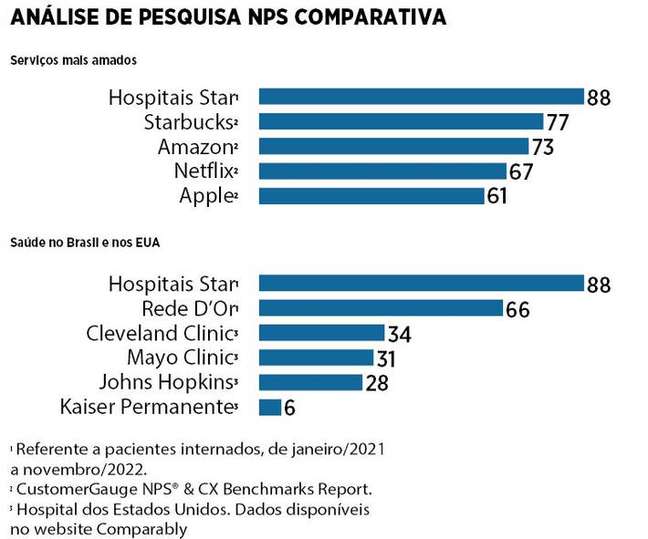Find out how the largest healthcare company in Latin America listens to its patients
Listening to the patient and knowing how they evaluate the service provided is something central to Rede D’Or. In the 71 hospitals in the group, one of the methods used for this is the Net Promoter Score (NPS) survey. Applied worldwide by many companies, the NPS measures the level of customer retention.

For example, “On a scale of 0 to 10, how likely are you to recommend our hospital to a friend or family member?” Those who give high marks show trust in the institution and are likely to return if the need arises.
“The patient, as a consumer, is increasingly demanding. It is important to understand the perception that the patient has of the delivery made, at all the points of interaction within its path”, assesses Gilberto Fonseca, Director of Perceived Quality and Ombudsman of Rede D’Or.
When responding to an NPS satisfaction survey, the patient evaluates their entire journey, whether it’s in hospitalization, the emergency room, appointments, or exams. This helps the Ombudsman identify opportunities for improvement.
“The NPS assesses the level of loyalty, something much more complex than patient preference,” says Sharon Ordeno, who worked for 16 years as an analyst on the Ombudsman team at Rede D’Or. “The loyal patient has a loving relationship with the institution based on previous positive experiences.”
Search improvements
In a Rede D’Or hospital in São Paulo, patients undergoing surgery in the afternoon gave low marks for nutrition. An analysis of the research revealed the reason: after long hours of fasting, the patient received a snack in the afternoon and not a full meal after the operation. The solution was to serve full meals at that time as well, which led to an immediate increase in the satisfaction rate.
Another hospital implemented an action to improve its emergency care by focusing on more empathic communication. The patient who waits more than 30 minutes receives immediate contact, even in the waiting room or studio. “The physician’s active listening and the attention provided by the staff increased the NPS score,” says Sharon.
How do you search?
At Rede D’Or, to ensure that the patient feels free and pressure-free for assessment, questions are only sent by email after you leave the hospital. The average response rate is 15%.
For Fonseca, technical quality is essential for the health service and the perceived quality completes the excellence of the services. “The user expects agile, welcoming and humanised care, where communication is clear and assertive. This is the formula for patient satisfaction.”
The Improvement Committees are present in the 71 hospitals of the Rede D’Or in Brazil. “Part of my job consists of following the patient’s journey within the departments. And every day I develop a more sensitive gaze on the human being, understanding the responsibility of being the customer’s voice in the company. Anyone who works with health must be people who like people. You must have a love of life and a pleasure in serving,” says Sharon.
Perceived quality is directly related to expectations: what the customer expects and what they actually receive. “Needs are unique, individual. The better I understand the patient’s behavior, the better the experience offered. It is a constant search to improve processes and guarantee the best patient-centered care”, concludes Fonseca.
six stars concept
The score includes the group’s 71 hospitals in the country
Rede D’Or has NPS results superior to those of large international referral hospitals, such as Mayo Clinic and Cleveland Clinic, in the United States. This score refers to the average of all 71 hospitals in the group in Brazil.
At Star Hospitals, the result is even better. All are in the NPS Zone of Excellence, with scores comparable to the world’s most beloved brands.
The Star units specialize in highly complex treatments, with unique technologies, referral doctors, personalized treatments and short hospital stays.
There are currently three Star hospitals in Brazil – Vila Nova Star (São Paulo), Copa Star (Rio de Janeiro) and DF Star (Brasília) -, as well as the Onco Star clinic and Maternidade São Luiz Star, both in São Paulo.
The NPS numbers show that Rede D’Or’s commitment to patients does not go unnoticed.


🇧🇷The best content in your email for free. Choose your favorite Terra newsletter. Click here!
Source: Terra
Ben Stock is a lifestyle journalist and author at Gossipify. He writes about topics such as health, wellness, travel, food and home decor. He provides practical advice and inspiration to improve well-being, keeps readers up to date with latest lifestyle news and trends, known for his engaging writing style, in-depth analysis and unique perspectives.


-qdsqacs9y82p.png)





